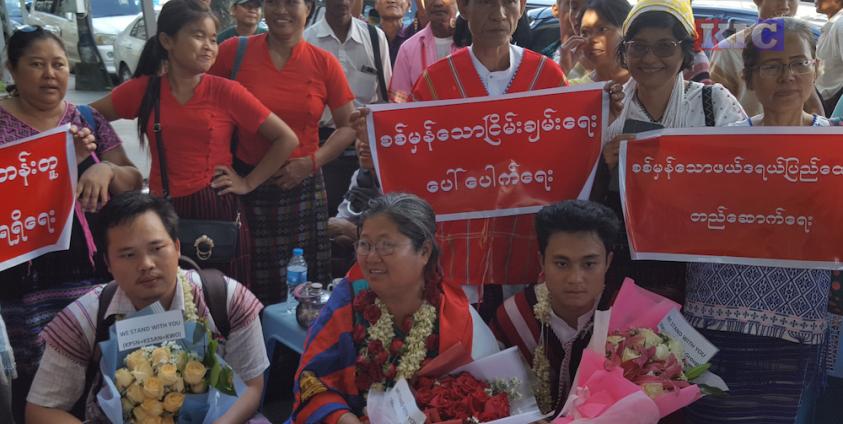Burma’s government has come under scrutiny for arresting three Karen for organizing a peaceful community ceremony and to use the word ‘Martyrs’. The event was to commemorate the 69th Karen Martyr’s Day held in Rangoon on August 12.
The three organizers, Karen Women Union, chairperson, Naw Ohn Hla, Saw Albert Cho and S’ Thein Zaw Min were charged under section 20 of the Peaceful Assembly and Peaceful Procession Law.
The Karen Human Rights Group issued a statement strongly condemning the “instrumentalization of restrictive laws to curtail the right to freedom of expression and assembly of ethnic minority activists, and prevent them from holding events to celebrate their culture and history.”
KHRG said the arrests were a clear example of how “the Myanmar government uses laws, violence and economic measures to oppress ethnic minorities. The Peaceful Assembly and Peaceful Procession Law only requires organizers of public events to notify the authorities at least 48 hours in advance.”
The Karen National Union demanded the “unconditional release of KWU Chairperson Naw Ohn Hla and the withdrawal of prosecution against two Karen youths Saw Albert Cho and S’ Thein Zaw Min, for holding the 69th Anniversary Ceremony of the Karen Martyr’s Day.”
The KNU are signatures to the National Ceasefire Agreement with the government and quoted in its statement agreed to NCA positions and “urged the Government to show its political will in establishing genuine democracy and federalism with accountability, responsibility and the recognition of the different ethnic identities that was agreed and signed, by both the Government and EAO’s, and states in Chapter 1, Article 1(f) to “Collectively establish a common national identity that embraces the diverse ethnicities and languages by recognizing the distinctive history, cultural practices, literature, language and national characteristics of all ethnic nationalities living within the Republic of the Union of Myanmar”.
A source involved in the peace process said the arrests of the three Karen was systematic of how the Burma government, it’s authorities and military treated ethnic people. “They don’t understand or care what ethnic people want. They think ethnic people are less worthy. They have no idea. The discrimination comes from the top, they this concept of Burmanization – it will take a long time for us to trust them.”
The Karen Peace Support Network said in a statement the NLD government has the authority to drop all charges against the three organisers and “repeal repressive laws used to restrict freedom of expression, and we call upon the government to do so.”
KPSN said “banning of the use of the word Martyrs for the event highlights a problem relating to the lack of understanding and acceptance of authorities in Burma that Burma is a multi-ethnic multi-religious country, where different people have different traditions, histories and national days.”
The KPSN underline the importance of Martyr Day to Karen people. “Remembering the anniversary of the assassination of Saw Ba U Gyi, and remembering others who have fallen in our struggle for our rights, is just as important as Burmese Martyrs Day on 19th July is for ethnic Burmans.” The KPSN said the ban and arrests have generated anger, distrust and is contributing to already high distrust over the way the peace process is being implemented.”
The KPSN said the government should not underestimate the importance of Karen Martyr’s Day as “many Karen families have lost loved ones in the decades of conflict as the Burmese Army sought to subdue us, control our land and take our natural resources. This is an issue very close to our hearts. It should not be underestimated how much this is undermining trust of the government and of the peace process.”
The KPSN pointed out if the government and the military were genuine in wanting to achieve peace it will “require an acceptance of all ethnic and religious groups in Burma as equal, with an equal right to celebrate days that are significant for them, and to be able to call those days by their correct name.”







